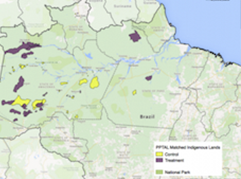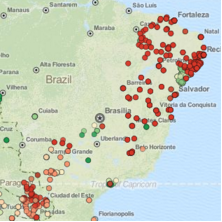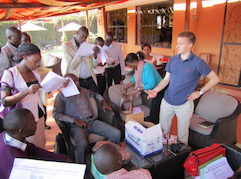Related Pages
AidData's Research and Evaluation Unit
The mission of AidData’s Research and Evaluation Unit is to bring expertise in development finance, big data, experimental design, geospatial impact evaluations and analysis, and country capacity-building to make development decisions and finance more transparent, accountable and effective. We aim to inform our own efforts in aid mapping and promoting citizen feedback through rigorous evaluation of the assumptions that underpin the broader transparency for development agenda. Using a variety of data sources, including project-level data, high-resolution satellite imagery, and geo-located surveys, we work across sectors in the aid transparency space, producing both policy-relevant and peer-reviewable quality research. The Research and Evaluation Unit also coordinates the AidData Research Consortium (ARC), leveraging the skills and sector experience of over 100 researchers at 50 universities worldwide.
Spatial Impact Evaluation: Land Rights and Deforestation Rates

AidData is collaborating with the German Development Bank (KFW) on a large-scale evaluation of land rights and enforcement on deforestation rates in the Brazilian Amazon. The collaboration employed 30 years of remotely-sensed landcover outcome data to provide a rigorous estimate of program impact. Between 1995 and 2008 (see image to the right), the project demarcated 106 indigenous lands in the Brazilian Amazon. As part of the collaboration, KfW provided detailed boundaries of community lands, administrative data on the criteria and timing for treatment, and additional project documents. AidData processed high-resolution satellite imagery and employed quasi-experimental matching and panel methods to estimate program impacts on forest cover. We tested the effect of demarcation on deforestation rates using propensity score matching and fixed effect techniques.
Value for Money for Foreign Aid Impacts on Carbon Sequestration and Biodiversity

Our interdisciplinary research team along with the World Bank’s IEG developed a framework for a value-for-money (VFM) assessment of the standing tropical forests. By combining contextual information about the World Bank-funded development projects with (a) data on the costs of historic projects, and (b) existing research on the value of tree coverage in terms of carbon sequestration and biodiversity, we provided an analysis of VFM for historic projects, and a recommended methodology for VFM assessments based on the proposed location(s) of future World Bank projects. The final dataset included 19,940 project locations and our analysis also used relevant covariates and outcome variables at each World Bank project site sourced from datasets with global coverage - including population, distance to urban areas, nighttime lights, distance to roads and rivers, a variety of environmental characteristics: climate, slope, and elevation as covariates, and in-situ measurements of biodiversity and satellite estimates of vegetation as outcomes.
Randomized Control Trial: Governance in Niger

AidData is conducting an impact evaluation in Niger to understand improved collective responsiveness through increased multi-stakeholder contributions to public goods provision, or public goods reform implementation. In particular, the impact evaluation will assess the degree to which the Participatory Responsive Governance strategy for increased multi-stakeholder coordination and collective action leads to change in the coverage and quality of public goods that meet citizen priority needs.
Check Out AidData's Geospatial Impact Evaluation Work
Meet One of AidData’s Research and Evaluation Experts

Professor Ariel BenYishay heads AidData’s Research and Evaluation Unit and is a Development Economist specializing in empirical microeconomics, geospatial impact evaluations and randomized control trials (RCTs). His current research focuses on the impacts of foreign aid programs on agriculture and deforestation as well as human health and social capital. He leads several large-scale RCTs, including one in the Philippines and several in Malawi.
Find out more about Professor BenYishay and the rest of AidData’s research and evaluation team on Our Staff page.
To find out more about AidData’s research and evaluation capabilities, contact AidData's Director of Partnerships and Communications, Alex Wooley, at awooley@aiddata.org.
